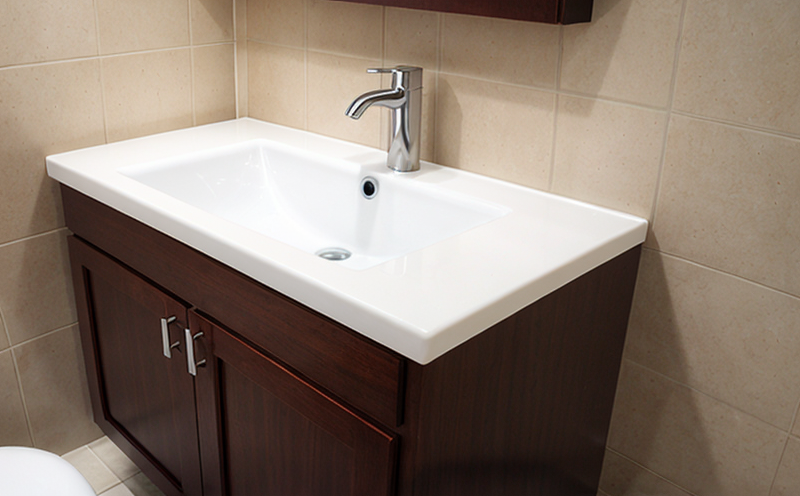JIS K 7217 Resistance to Cleaning Agents Testing of Bathroom Plastics
The JIS K 7217 test method is a critical procedure used in the plastics industry, particularly for bathroom and sanitary applications. This test assesses the resistance of plastic materials commonly found in bathroom fixtures such as faucets, showerheads, and other plumbing accessories to cleaning agents that are frequently encountered during use.
The primary goal of this testing is to ensure that these products maintain their aesthetic appeal, functionality, and durability over time. Cleaning agents can vary widely from simple soaps and detergents to more aggressive chemicals used for tough stains or odors. Understanding the resistance levels of materials under various cleaning conditions helps manufacturers design products that meet consumer expectations while ensuring long-term performance.
The testing process involves exposing plastic samples to a series of cleaning solutions according to specified JIS K 7217 parameters, followed by evaluation based on predefined criteria. This ensures consistent quality across different batches and production runs, which is essential for maintaining brand reputation and customer satisfaction within the bathroom and sanitary goods sector.
For manufacturers aiming to comply with international standards or enter new markets, this test provides valuable data supporting product certification processes such as CE marking in Europe. Compliance with JIS K 7217 not only enhances market access but also demonstrates a commitment to quality that resonates positively with consumers worldwide.
| Parameter | Description |
|---|---|
| Sample Preparation | Cut standardized samples from the product, ensuring they represent typical usage conditions. |
| Cleaning Agent Selection | Select cleaning agents representative of those used in bathroom environments. Include both mild and harsh formulations. |
| Test Duration | Expose samples to cleaning solutions for a specified duration, typically ranging from 24 hours up to one week depending on the expected lifespan of the product. |
| Evaluation Criteria | Assess changes in color, surface texture, and overall appearance after exposure. Additionally, check for any signs of structural damage or deterioration. |
Scope and Methodology
- Sample Preparation: Cut standardized samples from the product, ensuring they represent typical usage conditions.
- Cleaning Agent Selection: Select cleaning agents representative of those used in bathroom environments. Include both mild and harsh formulations.
- Test Duration: Expose samples to cleaning solutions for a specified duration, typically ranging from 24 hours up to one week depending on the expected lifespan of the product.
- Evaluation Criteria: Assess changes in color, surface texture, and overall appearance after exposure. Additionally, check for any signs of structural damage or deterioration.
Customer Impact and Satisfaction
The JIS K 7217 test plays a pivotal role in enhancing customer satisfaction by ensuring that bathroom plastic products remain visually appealing and functional even after repeated exposure to cleaning agents. By conducting this test, manufacturers can identify potential weaknesses early on during the development phase, allowing them to address issues before product release.
Compliance with JIS K 7217 also contributes significantly towards achieving regulatory compliance requirements, which is crucial for international trade and market entry. This alignment fosters trust among consumers who value products that meet recognized standards of quality assurance.
In summary, the implementation of JIS K 7217 testing helps maintain high levels of customer satisfaction by delivering products that not only look great but also perform reliably under real-world conditions. It supports sustainable business practices through informed decision-making based on empirical data rather than guesswork.
International Acceptance and Recognition
- The JIS K 7217 test is recognized globally for its relevance in evaluating the resistance of plastic materials to cleaning agents used in bathrooms.
- This standard has been adopted by numerous countries worldwide, including Japan, South Korea, Taiwan, and parts of Europe.
- Manufacturers who adhere to JIS K 7217 can expect smoother regulatory processes when exporting their products internationally.
- The test results are accepted in many quality management systems and certification programs, enhancing market access opportunities for compliant companies.





